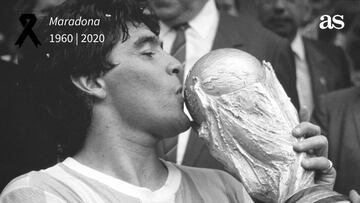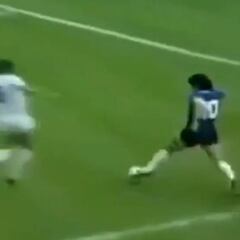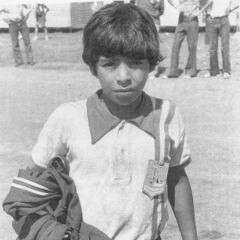Diego Maradona dies aged 60
The Argentina and Napoli legend, considered by many the finest player of all time, has passed away at from a heart attack as he recovered from an operation for a blood clot on the brain.

Argentina and Napoli legend Diego Maradona has died, it has been announced. The World Cup-winning attacking midfielder, who was widely regarded as the greatest player ever to grace the game, had recently been admitted to hospital in La Plata with a subdural haematoma. Argentinean media outlet Olé reported that Maradona, 60, died of a cardiac arrest at his residence in Tigre on Wednesday.
Maradona's recent health problems
The Argentine president has announced three days of mourning to honour Diego Maradona 🇦🇷 pic.twitter.com/7n4wVptzVF
— SPORTbible (@sportbible) November 25, 2020
At the start of November, the former player was admitted to the Clínica Ipensa, in La Plata, suffering from anaemia and depression, and was hospitalised for further tests. He was diagnosed with a subdural haematoma - a blood clot on the brain - which required immediate surgery, meaning Maradona was transferred to the Clínica Olivos.
That journey, of 73.2 km was the last time he would feel the love of his fans, who were there for him on departure and arrival. After several days at home Maradona suffered a heart attack from which he did not recover. According to his surgeon, Leopoldo Luque, although the surgery he underwent was routine, Maradona’s body, damaged by years of abuse was unable to overcome the situation.
Touched by the hand of God
Glorious with Barry Davies. https://t.co/uyrgc1h1DF
— Max Rushden 💙 (@maxrushden) November 25, 2020
Maradona emerged as a youngster at Argentinos Juniors where he made his professional debut aged 15 before moving to Boca Juniors. Blessed with electric pace and an otherworldly mastery of the ball, Maradona swiftly asserted himself as one of the finest players of his generation. A world record move to Barcelona confirmed his value but it was at Napoli where the Cosmic Barrel would be elevated to the status of a god.
The Serie A side had long laboured in the shadow of Juventus, the Italian powerhouse sweeping all before them with three-times Ballon d’Or winner Michel Platini pulling the strings but the arrival of Maradona at the San Paolo unstitched the fabric of Italian football and the resized the limits of the sport itself. Napoli were no one-man team with Maradona, but the Argentinean played like a man possessed in Naples, sparking a lifelong love affair between the player and the Partenopei.
Napoli had not won the Serie A title in 60 years of existence and they have not lifted the trophy in the almost 30 years since Maradona departed. In the interim, during a four-year spell when the stars aligned and Maradona was an unstoppable force of nature, the Argentinean delivered two, in 1986-87 and 1989-90. In the same era, Maradona led his country to the 1986 World Cup, scoring arguably his two most famous goals in a single game against England. He would attribute the first to the hand of God, but the second was entirely the work of the boot of Maradona, a footballing deity floating across the pitch of the Azteca Stadium oblivious to the flailing legs of mere mortals.
Related stories
But the hand of genius did not rest lightly on Maradona’s shoulder. Off-field issues in Naples gradually eroded his ability to carry the hopes of an entire city and after delivering the 1990 Scudetto Maradona’s excesses spilled into the public domain. A lengthy ban for using cocaine ended his Napoli career. Spells at Sevilla, Newell’s and a return to Boca followed but the magic had gone. Whatever ethereal bond had tied Maradona and Napoli together could not be recreated. He was the perfect player for the time and place but the gentrification of football was well underway as the 80s became the 90s and Maradona, who revelled in the pursuit of self-destruction as furiously as he attacked opposition defences could no longer maintain the delicate balancing act.
An eclectic managerial career included two years as Argentina manager but Maradona’s demons were never far from the touchline. A long battle against his addictions provided the backdrop to his post-playing days and he often found himself on the wrong side of the headlines. Few players have ever inspired in the same way as Maradona. A flawed genius with whom the fans could relate: Maradona was one of them. He possessed a common touch entirely at odds with his celestial skill. Had he emerged in a more sterile era, been a more dedicated professional, there would perhaps be no debate over the greatest player of all time. But had that been the case, he would not have been Maradona.

